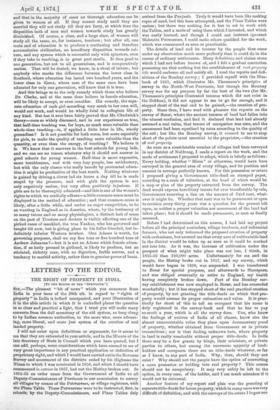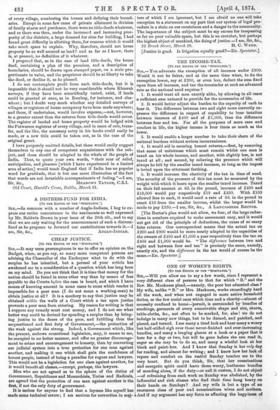LETTERS TO THE EDITOR.
THE RIGHT OF PROPERTY IN INDIA.
(To THE EDITOR OF THE " SPEOTATOB."]
Stu,—The pleasant "bit of news" which you announce from India in your issue of the 28th ult. in regard to "rights of property" in India is indeed unexpected, and your illustration of it in the able article in which it is embodied places the question in so clear and practical a light, that I trust you will make many converts from the dull monotony of the old system, so long clung to by Indian revenue authorities, to the more wise, more advanc- ing, more liberal, and more just system of the creation of real landed property.
I will not enter upon definitions or arguments, for it seems to me that they are exhausted in your article, and in the Minute of the late Secretary of State in Council which you have quoted, but I can add, perhaps, some considerations which have seemed to me of very great importance in any practical application or definition of proprietary right, and which I would have carried out in the Revenue Survey and assessment of the districts ceded by his Highness the Nizam to which I was nominated in 1856, and which I should have commenced in extenso in 1857, had not the Mutiny broken out. In 1854-55 an order came from the Government of India to all Deputy-Commissioners of Provinces in our commission to survey all villages by means of the Putwarrees, or village registrars, with the Plane Table. These Putwarrees were to be instructed, first, in schools, by the Deputy-Commissioners, and Plane Tables duly
arrived from the Punjaub. Truly it would have been like making ropes of sand, bad this been attempted, and the Plane Tables were useless; but there was nothing for it but to set to work with the Tables, and a mode of using them which I invented, and which was easily learned, and though I could not instruct ignorant Mahratta Putwarrees, I could make others qualified for the work, which was commenced as soon as practicable.
The details of land and its tenures by the people thus came under my observation much more perfectly than it could do in the course of ordinary settlements. Many definitions and claims arose which I had not before known of, and I felt a gradual conviction possessing me that nothing but the establishment of real-property title would embrace all and satisfy all. I read the reports and defi- nitions of the Bombay survey ; I provided myself with the Blue- book of 1853, which illustrates Mr. Thomason's principles of survey in the North-West Provinces, but though the Bombay survey was for my purpose by far the best of the two (for Mr. Thomason's principles illustrated tenures which did not exist in the Dekkan), it did not appear to me to go far enough, and it stopped short of the real end to be gained,—the creation of pro- perty. Since then, I have read with pleasure the reports on the survey of Berar, where the ancient tenures of land had fallen into the utmost confusion, and find it declared that land had already assumed a real value, that tenure of occupation was sure, and the assessment had been equalised by rates according to the quality of the soil ; but like the Bombay survey, it seemed to me to stop short of the points most essential to the proprietor,—the creation of real property.
As soon as a considerable number of villages had been surveyed in my district of Nuldroog, I made a report on the work, and the mode of settlement I proposed to adopt, which is briefly as follows : Every holding, whether "Mires" or otherwise, would have been surveyed in the general area of every village, and its position and amount in acreage perfectly known. For this possession or estate I proposed giving a Government title-deed on stamped paper, according to a scale of valuation, at the head of which would be a map or plan of the property extracted from the survey. The deed would express hereditary tenure for ever transferable by sale, Government reserving a lien on the amount of fixed rent, what- ever it might be. Whether that rent was to be permanent or open to revision every thirty years was a question for the present left open, as neither a proper valuation nor assessment of the land had taken place ; but it should be made permanent, as soon as finally assessed.
Before I had determined on this course, I had laid my project before all the principal zemindars, village headmen, and influential farmers, who not only welcomed the proposed creation of property with enthusiasm, but assured me that every acre of cultivatable land in the district would be taken up as soon as it could be marked out into lots. As it was, the increase of cultivation under the prospect of what might take place was not less, I think, in 1855-56 than 240,000 acres. Unfortunately for me and the people, the Mutiny broke out in 1857, and my survey, which would have begun in 1858, was suspended. I was transferred to Berar for special purposes, and afterwards to Shorapore, and was obliged eventually to retire to England, my. health having completely broken down. Part of the Bombay sur- vey establishment was now employed in Berar, and has succeeded wonderfully ; but it has stopped short of the real practical creation of property, by not granting the title-deeds on which that pro- perty would assume its proper estimation and value. It is prac- tically far short of this to tell an occupant that his name is duly registered in the survey-book and that he has to pay so much a year, which is all the survey does. You, who know the feelings of natives of India of all classes, know also the almost unaccountable value they place upon documentary proof of property, whether obtained from Government or in private transactions ; nor is that feeling unknown here, where property in land is really unsaleable without proper title-deeds. In India there may be a few grants by kings, their ministers, or private parties to others, but among the enormous majority of land- holders and occupants there are no title-deeds whatever, so fax as I know, in any part of India. Why, then, should they not exist ? Wby should not the people have the option of converting a mere possession or holding into real property ? This course should not be compulsory. It may very safely be left to the option, in every case, of the holder, and I am much mistaken if it would not be universal.
Another feature of my report and plan was the granting of separate ti tle- deeds for house property, which in many cases was very difficult of definition, and with the surveys of the estate I began one of every village, numbering the houses and defining their bound- aries. Except in some few cases of private allotment in division of family shares and purchases, there were no title-deeds whatever, and as there was then, under the increased and increasing pros- perity of the districts, a large demand for sites for building, I had found great difficulty in allotting them, for reasons which it would take much space to explain. Why, therefore, should not house property be as well secured as land? and as far as I know, there is, at present, no definition of it whatever.
I proposed that, as in the case of land title-deeds, the house deed, containing a plan of the premises, and a description of boundaries, should be drawn upon stamped paper, on a scale pro- portionate to value, and the proprietor should be at liberty to take the deed, or decline it, as he pleased.
I do not contemplate profit from such title-deeds, but it is impossible that it should not be very considerable where Khusrah surveys, if they have been scientifically tested, exist, if lands could be granted at once, as in Bombay, for instance, and else- where ; but I doubt very much whether any detailed surveys of villages or registers of house occupancy have been made anywhere; and these, if undertaken, would involve expense,—not, however, to a greater extent than the returns from title-deeds would cover. The register of landed and house property would be lodged with the Putwarree registrar of every village, and in cases of sale, trans- fer, and the like, the necessary entry in his books could easily be made, or a new title could be taken out, as in the case of the original grant.
I have purposely omitted details, but these would easily suggest themselves to any one of competent acquaintance with the sub- ject, and these should be adapted to the whole of the people of India. Thus, to quote your own words, "their roar of relief, anticipation, and pleasure [which I have experienced in a limited area of action] would teach England that if India has no popular word for gratitude, that is but one more illustration of the fact that words are not invariable accompaniments of feeling."—I am,



































 Previous page
Previous page